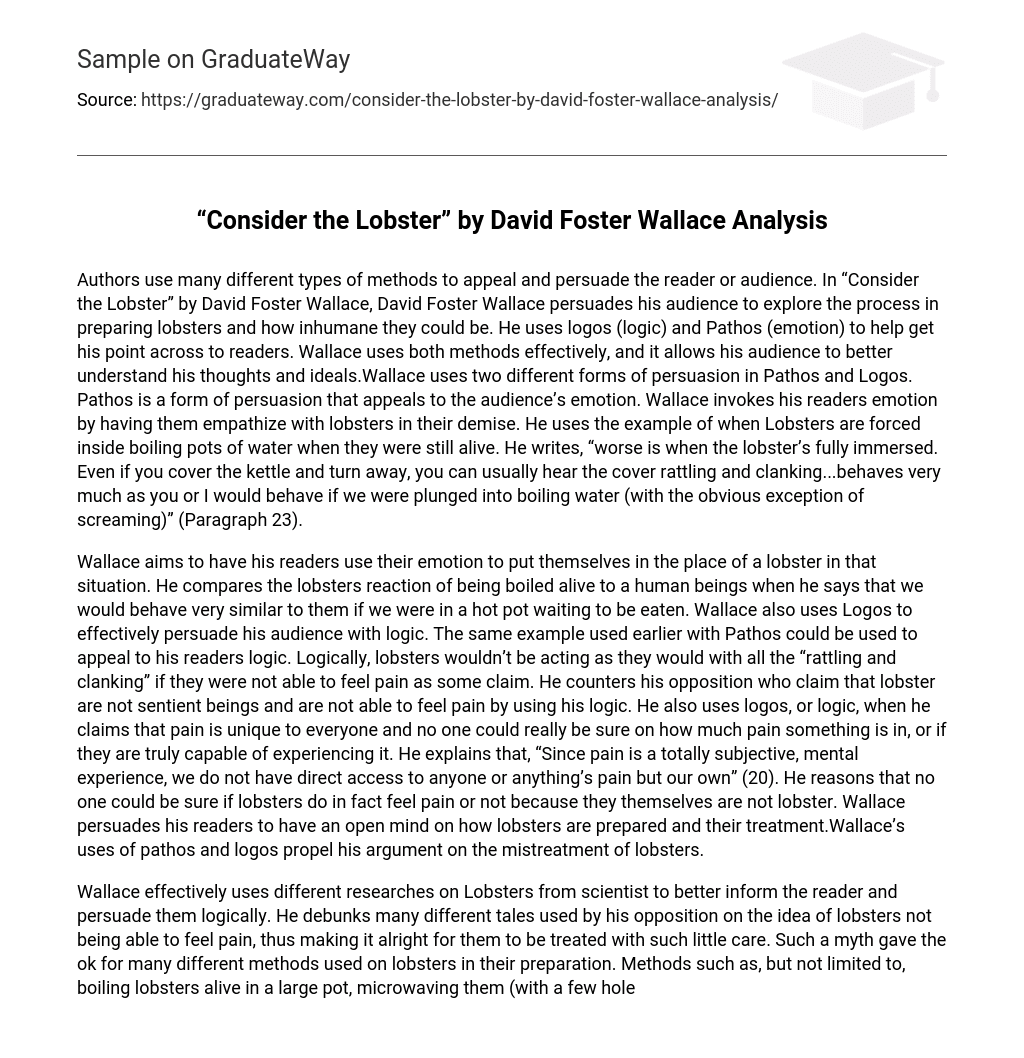Authors use many different types of methods to appeal and persuade the reader or audience. In “Consider the Lobster” by David Foster Wallace, David Foster Wallace persuades his audience to explore the process in preparing lobsters and how inhumane they could be. He uses logos (logic) and Pathos (emotion) to help get his point across to readers. Wallace uses both methods effectively, and it allows his audience to better understand his thoughts and ideals.Wallace uses two different forms of persuasion in Pathos and Logos. Pathos is a form of persuasion that appeals to the audience’s emotion. Wallace invokes his readers emotion by having them empathize with lobsters in their demise. He uses the example of when Lobsters are forced inside boiling pots of water when they were still alive. He writes, “worse is when the lobster’s fully immersed. Even if you cover the kettle and turn away, you can usually hear the cover rattling and clanking…behaves very much as you or I would behave if we were plunged into boiling water (with the obvious exception of screaming)” (Paragraph 23).
Wallace aims to have his readers use their emotion to put themselves in the place of a lobster in that situation. He compares the lobsters reaction of being boiled alive to a human beings when he says that we would behave very similar to them if we were in a hot pot waiting to be eaten. Wallace also uses Logos to effectively persuade his audience with logic. The same example used earlier with Pathos could be used to appeal to his readers logic. Logically, lobsters wouldn’t be acting as they would with all the “rattling and clanking” if they were not able to feel pain as some claim. He counters his opposition who claim that lobster are not sentient beings and are not able to feel pain by using his logic. He also uses logos, or logic, when he claims that pain is unique to everyone and no one could really be sure on how much pain something is in, or if they are truly capable of experiencing it. He explains that, “Since pain is a totally subjective, mental experience, we do not have direct access to anyone or anything’s pain but our own” (20). He reasons that no one could be sure if lobsters do in fact feel pain or not because they themselves are not lobster. Wallace persuades his readers to have an open mind on how lobsters are prepared and their treatment.Wallace’s uses of pathos and logos propel his argument on the mistreatment of lobsters.
Wallace effectively uses different researches on Lobsters from scientist to better inform the reader and persuade them logically. He debunks many different tales used by his opposition on the idea of lobsters not being able to feel pain, thus making it alright for them to be treated with such little care. Such a myth gave the ok for many different methods used on lobsters in their preparation. Methods such as, but not limited to, boiling lobsters alive in a large pot, microwaving them (with a few holes poked in to keep them from imploding) to save time for the chef, or even eating them when they’re still alive which is a common practice in Europe. Wallace uses both logic and emotion to counter their beliefs and ideals.
With introducing the notion that lobsters might indeed be able to feel pain, he aims for the reader to feel for the lobster and put themselves in the position of the lobster when they’re being boiled alive, or even dismembered and eaten when they’re still kicking and screaming. Wallace also compares how different animals could be perceived differently to people in being consumed in large festivals like the Maine Lobster Festival. He uses the cows as a comparison for lobsters. He questions that if the general population are ok and fond of large festivals like the Maine Lobster Festival and the mass consumption of lobsters, why isn’t there a large festival for cows and their beef. Where he writes, “Try to imagine a Nebraska Beef Festival at which part of the festivities is watching trucks pull up and the live cattle get driven down the ramp and slaughtered right there on the World’s Largest Killing Floor or something-there’s no way”(16). He introduces the idea of cows being in the place of lobsters in large festivals like the MLF. People would not perceive such an idea as well as if there were cows instead of lobsters. He uses that logic to question why people would be accepting with lobster’s being prepared in large festivals, but not be alright and accepting with another festival that would do the same exact thing but with the mass execution of cows. Wallace aims for such festivals like the MLF to be perceived with the same amount of disgust as people would have if they featured cattle and their beef instead.
Wallace successfully uses both logos and pathos to appeal to his readers logic and emotion to persuade his readers effectively. David Foster Wallace is successful in being able to influence his audience to extend their morals to lobsters and their inhumane ways of preparation. He is successful in such by being effective in his use of the forms of persuasion logos, and pathos to appeal to his readers. Using his experiences in the Maine Lobster Festival, and researches from scientist, he is able to leave his audience with an open mind on the mistreatment of lobsters and how cruel our practices truly are towards them. He emphasizes the use of evidence to appeal to his readers with logic and as well as emotion. Wallace also uses different examples throughout the passage to be able to evoke emotion and have his readers empathize with lobsters and their hardships. David Foster Wallace was successful in being able to persuades his audience toward his beliefs with his effective use of pathos, and logos.





